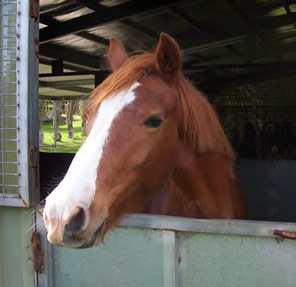Over the stable door
Greetings Fellow Equines and Horse Owners!
And still the dry continues. Luckily we seem to have survived the summer without the dreaded bushfires. The risks for horses in such long dry conditions include heat stress, not having adequate shelter, the need to drink extra water and foraging on barren ground. On a really hot day a horse can drink up to around 60 litres of water, so keeping an eye on the water supply is very important. If your horse is in work for competition reasons, he may be needing some extra electrolytes to replace salts lost during exercise. If he is dehydrated, you can do a pinch test on the soft flesh on the side of his neck. If you pinch the skin and let go, it should return immediately to its former state. If it stays up in a little ridge, then he is dehydrated. Horses should always have ad lib access to good quality water. If you do need to work your horse in the hot weather, it is far better to time it for either early in the day or later when the heat has abated. If it is uncomfortable for you, it will be uncomfortable for him too. Give him a nice hose down afterwards, no need to scrape as the water will keep him cool longer as it evaporates.
With the paddocks becoming bare, there is the risk of the horse ingesting soil, sand and grit as he forages. If the soil is sandy, there is quite a risk of ingestion and subsequently sand colic. So make sure your horse has plenty of ad lib hay, preferably off the ground or in an area where he will not pick up soil. A large heavy rubber mat can be useful for that. It would need to be at least 2 x 1m. With more than one horse, the large round bales can work, but there tends to be quite a bit of wastage. It really depends on each person’s situation.
Providing shade and shelter is very important too. Again, if more than one horse, make sure that there is plenty of room for all of them to shelter safely, or at least a second area that can be used. Many horses with white markings on their faces etc can be prone to sun burn, even if a shelter is provided. There are many varieties of face masks on the market to suit every horse and its requirements. Some are much better than others, so it pays to shop around. The way some of them fit is not ideal, so it can be useful to have your horse’s head measurements when going to purchase. Or check with your horsey friends – share information! Some of the best information you can get will be from people who have used a product, not necessarily what the manufacturer proclaims.
Yours truly is holding my weight at around the 500 kg mark before being worked, but it always drops down afterwards much to my owner’s relief!
Safe riding and in anticipation of some rain!
Hamish

